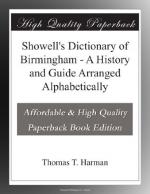1840, January.—Mr. Attwood having resigned, Sir Charles Wetherell appeared in the Conservative interest against Mr. G.F. Muntz. Mr. Joseph Sturge, who also issued an address to the electors, retiring on the solicitation of his friends, on the understanding that the whole Liberal party would support him at the next vacancy. The result was in favour of Mr. Muntz, thus—
Geo. Fred. Muntz .. 1,454—Returned. Sir C. Wetherell .. 915
1841, July.—Mr. Richard Spooner, who opposed Messrs. Muntz and Scholefield, was again defeated, through receiving the suffrages of double the number of electors who voted for him in 1835. The returns were—
Geo. Fred. Muntz .. 2,176 }
Joshua Scholefield .. 1,963 }Returned.
Richard Spooner .. 1,825
1857, March.—The same gentlemen were again returned without opposition.
1857, August.—On the death of Mr. Muntz, though the names of George Dawson and others were whispered, the unanimous choice fell upon Mr. John Bright, “the rejected of Manchester,” and it may be truly said he was at that time the chosen of the people. Birmingham men of all shades of politics appreciating his eloquence and admiring his sterling honesty, though many differed with his opinions. Addresses were early issued by Baron Dickenson Webster and Mr. M’Geachy, but both were at once withdrawn when Mr. Bright consented to stand and his address appeared.
1859, April.—At the election of this year, though defeat must have been a foregone conclusion, Mr. Thomas D. Acland waged battle with Messrs. Scholefield and Bright, and the result was:—
William Scholefield .. ..4,425 }
John Bright .. .. ..4,282 }Returned.
T.D. Acland .. .. ..1,544
1864, December.—On the death of Mr. Spooner, Mr. Davenport-Bromley, (afterwards Bromley-Davenport) was elected un-opposed, and retained his seat until his death, June 15, 1884.
1864.—Householders, whose rates were compounded for by their landlords, had hitherto not been allowed to exercise their right of voting, but the decision given in their favour, Feb. 17, 1864, was the means of raising the number of voters’ names on the register to over 40,000.
1865, July.—Whether from fear of the newly-formed Liberal Association (which was inaugurated in February for the avowed purpose of controlling the Parliamentary elections in the borough and adjoining county divisions), or the lack of a sufficiently popular local man, there was no opposition offered to the return of Messrs. Scholefield and Bright at the election of this year.
1867, July.—On the death of Mr. Scholefield, Mr. George Dixon was nominated by the Liberals and opposed by Mr. Sampson S. Lloyd The result was:—
Geo. Dixon .. .. .. ..5,819 Returned. S.S. Lloyd .. .. .. ..4,214




